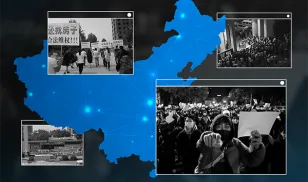
Perspectives November 23, 2020
Hong Kong’s Academic Freedom Withers under National Security Law
The law, imposed by Beijing, has exerted a creeping influence over the territory’s vaunted education sector.

When China’s Communist Party leadership imposed a new National Security Law on Hong Kong this summer, many predicted that it would undermine academic freedom. Indeed, four months after the law came into effect, its stifling impact on freedom of speech is being felt in schools and universities across the Special Administrative Region.
The law has prompted concern among local academics that they may be passed over for tenure or have contracts terminated because of their political opinions, that students may report them to authorities for the content of their lectures, and that formerly safe research topics or partnerships with foreign think tanks that criticize the Chinese government are now off-limits or dangerous.
The law has also harmed Hong Kong’s position as an attractive hub for international academic exchange in Asia. Scholars, professors, and students from other countries have been declining opportunities they might have previously pursued. Farther afield, instructors of Chinese studies in the United States and the United Kingdom have felt compelled to adopt precautions to ensure the safety of students with links to Hong Kong who are studying remotely during the COVID-19 pandemic.
Numerous incidents over the past two months highlight the creeping effects of the new National Security Law at all levels of the education sector:
- In late September, the Education Bureau stripped a primary school teacher of his teaching credentials for life in response to the teacher allegedly spreading “proindependence messages”—although the lesson in question occurred more than a year ago, in March 2019.
- On October 6, Hong Kong’s secretary for education, Kevin Yeung, warned teachers that any discussion of Hong Kong independence at elementary, secondary, and postsecondary schools was strictly off-limits.
- On October 10, the University of Hong Kong tore down a student-run “Lennon Wall” and barricaded the area over the objections of the student union. The area had been used to display prodemocracy and antigovernment slogans and posters.
- On October 13, former Hong Kong chief executive Leung Chun-ying published on his Facebook page a list of 18 teachers prosecuted for protest-related offenses. Leung—who is now a vice president of the mainland Chinese People’s Political Consultative Conference—claimed that the list, which included the teachers’ ages and the schools where they worked, was part of his effort to report protesters’ alleged criminal activity. The city’s largest teachers’ association and an education-sector lawmaker criticized the move as improper and an attempt to incite hatred.
- Students and alumni of the University of Hong Kong raised concerns about the October 27 decision of the university's governing council to appoint two mainland Chinese professors as vice presidents of research and academic development, respectively. One had previously been listed on the website of Tsinghua University as a member of the Communist Party, although he claimed this was incorrect. The move came after several academics at the university, considered Hong Kong’s most prestigious, lost their positions. They included prodemocracy professor Benny Tai, who was fired in July even though he had been tenured and his department and the university senate had objected to the move.
The tightening restrictions have galvanized pushback both inside and outside of Hong Kong. In addition to the concerns highlighted by local teachers’ unions, students, professors, and alumni, last month an open letter signed by more than 100 academics from 16 countries warned that the National Security Law’s claim of extraterritorial jurisdiction could damage global academic freedom. The letter said that the law could serve as the basis for imprisonment of scholars and students traveling through Hong Kong or China who engage in academic work considered subversive by Chinese authorities. Signatories called for a united and coordinated effort by universities and governments to address the challenge.
Indeed, as Hong Kongers grapple with the law’s impact and Beijing’s growing influence over their education sector and globally respected universities, the international community can provide vital support by responding quickly, consistently, and with a unified voice to assaults on academic freedom. Foreign partner institutions should also establish safeguards to ensure that they do not become complicit in such attacks, which pose a threat to independent intellectual inquiry around the world.
Related Articles
Q&A: Amid the Chinese Communist Party’s Authoritarian Rule, How Does Freedom House Uncover Dissent in China?
Perspectives
January 15, 2026



